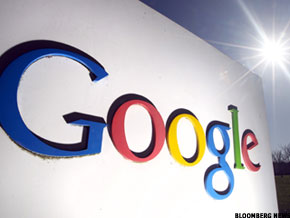Google, the pride of open everything, uses real blurry house number images as its Captchas, so that the general public can tell them what the number really is.
The tears have, it has come to my attention, mainly emerged from laughter at Google's sweet, thoughtful gall that everything it claims the world desires just happens coincidentally to benefit it commercially.
Still, no sooner had my eyes dried a little when the Telegraph offered me Google' latest exemplar of sheer, beautiful openness.
For it seems that Google is using real images from Street View as security checks. Yes, if you want to access your own Google account, the company is asking you to decipher a slightly blurry image of a real house number.
It seems that if enough people decide on a particular number, then Google sharpens up the image on Street View.
Yes, you are being asked to work for Google, Openly. For free. And if you don't, well, you may not be able to access your own Google account.
The Telegraph naturally declares that certain privacy groups are foaming at the lips on hearing of this little scheme -- which, according to a Google spokesman, only occurs in 10 percent of security questions.
But surely some people, on hearing of this and Google being fined $25,000 by the FCC for, um, non-compliance with its inquiry into Wi-Fi eavesdropping, might feel that openness has a highly subjective definition in Google's complex collective cranium.
Google's version of the open Web seems very simple: let us get at everything. Whether it's books, streets, houses, Facebook accounts, iPhoto accumulations or perhaps even the remains of your spaghetti bolognese.
Something is open if Google can see it and scrape it. And when Google sees it and scrapes it, it can create a fuller picture of every element of your life -- just in case, you know, some lonely advertiser might pass by and show interest.
Some might call this freedom. There again, doesn't freedom sometimes entail being free not to let rapacious, baby-faced organizations peer into your life?
Chris Matyszczyk is an award-winning creative director who advises major corporations on content creation and marketing. He brings an irreverent, sarcastic, and sometimes ironic voice to the tech world. He is a member of the CNET Blog Network and is not an employee of CNET.
.
Newscribe : get free news in real time
Related posts & articles:
Google's Business Experiment: Nothing but Web
Google+ face-lift triggers jibes over extra white space
Google plans major revamp for search engine
Google acquires more IBM patents
FCC Proposes: Fine for Google Wi-Fi snooping 'obstruction'
Google testing Google News tweaks
Sergey Brin, Google: Web freedom faces greatest threat ever. 'It's scary.' (nextlevelofnews.com)
Google's Sergey Brin: China, SOPA, Facebook Threaten the 'Open Web' (wired.com)




